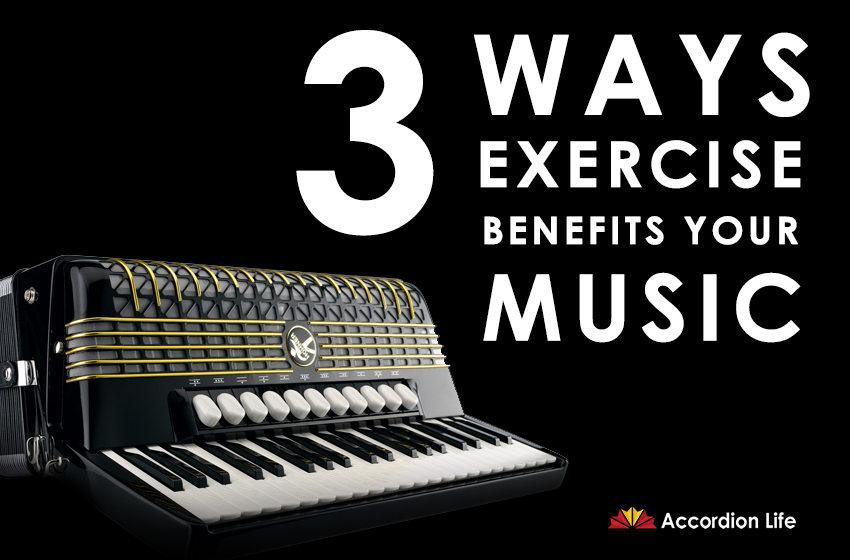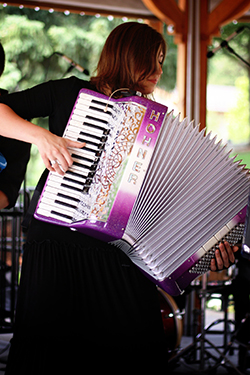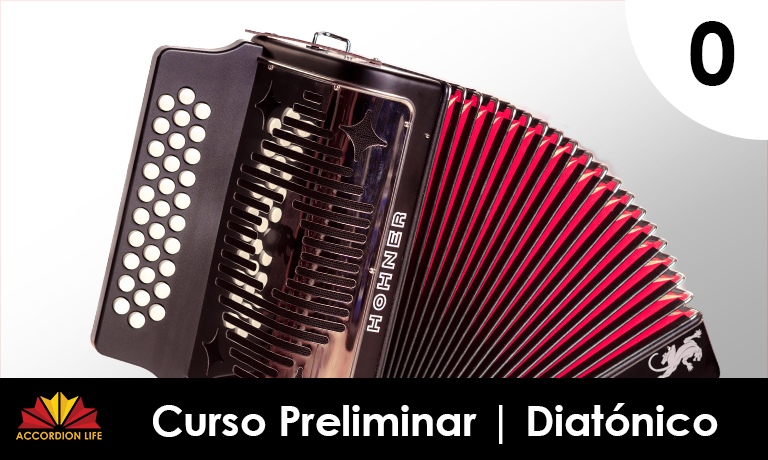
PLAYING THE ACCORDION takes skill, dedication, and fitness. Yes, I said fitness. Your body is your greatest ally when it comes to music.
Athletes value their bodies, taking care of them, nourishing them, and treating them like the fine piece of equipment they are.
Musicians … sometimes we take care of our bodies, but it’s not always high on the list of priorities.
Seriously, why should I take up exercise or running just to play accordion? I sit down (most of the time) to play and practice.
Why work out?
 1. Build Muscle
1. Build Muscle
While this may be obvious, working out does build muscle. One of the most common complaints of accordionists is back and shoulder pain. This can be caused by several factors, such as bad technique or posture. However, that is not always the case.
Building muscle can protect you from injury and make playing the accordion easier because you have the strength needed to control the instrument. This doesn’t mean you have to become a body builder –any steps you take toward building muscle, small or large, will benefit you and your music.
The accordion is a very physical instrument and requires the use of your entire body, not just your arms. Every movement of your body affects your music because the accordion is directly connected to you in a very intimate way.
Building muscle allows you to more easily control the accordion, the tension on the bellows, the movement of the instrument — all of which directly influence the quality of the sound.
While working out to build muscle is important, do not neglect stretching those muscles. Before any practice session, it is important to stretch your shoulders and arms. Hours of practice can take their toll and leave us with tense muscles that cause pain in our neck, shoulders, and back. I know because I have been there.
Take the time to stretch before you dive into practicing … it is well worth the extra minutes.
 2. Boost Energy
2. Boost Energy
I can’t tell you how many times I have skipped practice because I was too tired and didn’t have the energy.
I can tell you right now that I don’t work out nearly often enough. I work multiple job positions at our company — administrative assistant, teacher, and accordion repair tech, etc. Add the few hours of practice that I get in every day and all of that adds up to a lot of sitting down.
No wonder I’m tired so often.
Energy is what I lack, and energy is what I need.
While it seems counter-intuitive to go work out when I’m tired, research has shown that regular exercise decreases fatigue and increases energy.
Studies of sedentary people (like me) have been done throughout multiple age groups and even among people who have medical causes for fatigue such as cancer, diabetes, and heart disease. Healthy or dealing with a chronic condition, the research has proven that regular exercise boosts energy levels.
We’re not even talking crazy workouts like P90X. Even just adding regular walks to your routine can improve your energy levels.
More energy = better practice times.
I’ll take that.
3. Increase Your Brain Power
It can take some serious focus to figure out some passages of that tough song you’re learning; how the rhythms work, the musicality of it, the simple (or not so simple) process of learning how to play both hands at the same time.
For this, you and I need brain power.
The number of benefits that exercise brings to your brain alone is astounding. Take a look at just a few of the ways exercise helps your brain.
Exercise:
• Improves learning and focus.
• Lengthens attention span.
• Increases quick thinking.
• Improves memory.
That is only a few of many benefits that exercise gives your brain, and every single one applies to your music.
I need focus and improved learning for that new song I’m working on. The one that looks like someone spilled random notes all over the page.
A lengthened attention span would keep me focused on the music for longer instead of being easily distracted by Facebook or Pinterest.
An increase in quick thinking would help me figure things out faster, to assess what is needed and act on it.
Improving my memory? That sounds great!
That would help me more easily memorize a piece and remember what I need to work on from the lesson I just had five minutes ago. (Am I the only one who has walked out of a lesson and completely forgotten what my teacher said to work on?)
Exercise can and will help!
 Get Your Move On
Get Your Move On
Exercise is amazing. There are so many benefits that exercising gives us. This article only scratches the surface.
In future articles I will write more about specific exercises and stretches to help us as accordionists — and since diet can also be a huge factor, I will talk about that as well.
Your Turn
What are some ways that you get moving? Share by commenting below!
1 responses on "3 Ways Exercise Benefits Your Music"
Leave a Message
You must be logged in to post a comment.















I am basically self taught on the accordion. I did take a few lessons to get me on my way. It wasn’t easy for me with raising a family and shift work. I started learning at age 36. Been playing for just over thirty years. I love the sound on the instrument, thats what really got me going. I practice two hours every day, Some times I am tired in the evening but I keep pushing on. I probably play a bit more mechanically (because of my mechanical apptitudes) than emotionally, but people love to hear me play. I joined an Accordion Band and ended up taking it over. We have eight in our band and play at many seniors villages through out the year.
My point here is for accordionists who use their hands for mechanical, carpentry, warehouse work, where you are constantly putting strain on your hands and fingers and heavy lifting can affect your playing. I noticed this a few years back just doing yard work, cutting wood, lifting things, twisting lids of jars (that’s not good) would affect my playing skills. It would take a day or two for the wrists and fingers to come back with flexibility. Arthritis can affect your playing and you may not even realize it, and you wonder why you can’t make the movements. Yes, the rest of the body needs exercise, but be careful not to strain your wrists and fingers. Not very often, but I’ve even had a lazy finger on the keyboard, whereas it sticks on the key or won’t push down to play the note. Frustrating, but keep practicing folks. This is a great website.